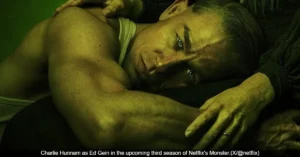The new Netflix series “Monster: The Ed Gein Story“ explores the tragic and terrifying life of one of America’s most infamous criminals. While the show details Ed Gein’s gruesome crimes, it also digs into his troubled family history, particularly the life and death of his father, George Gein. Understanding George’s story is key to understanding the environment that helped create the “Butcher of Plainfield.” Here is the real story behind George Gein’s alcoholism and death.
Who Was George Gein?
George Gein was the father of Ed and Henry Gein, living with his family on a remote farm in Plainfield, Wisconsin. In both the series and real life, George is depicted as a violent alcoholic whose behavior created a home filled with fear and tension.
Testimony from the time describes regular verbal and physical abuse directed at his wife, Augusta, and their two sons. This climate of fear played a significant role in Ed’s early emotional and psychological development. George’s long-term alcoholism and rough handling left indelible marks on his children, contributing to a traumatic and isolating upbringing.
The Cause and Circumstances of George Gein’s Death
George Gein’s life came to an end on April 1, 1940. He was 66 years old. The official cause of his death was heart failure, with chronic alcoholism listed as a contributing factor.
His death left Ed and his older brother, Henry, to manage the family farm under the total control of their mother, Augusta. With George gone, Augusta’s domineering and fanatically religious personality was unchecked, further isolating Ed and increasing his dependency on her.
“George Gein passed away in 1940 due to alcohol-related heart failure.”
A Home Life of Abuse and Isolation
George Gein’s alcoholism made for a tense and unstable home. The abuse he inflicted, combined with Augusta’s rigid religious beliefs and strictness, created a environment that suppressed the social and emotional development of both Ed and Henry.
Ed grew up shy and socially inept. Classmates and teachers remembered him as having strange mannerisms. Augusta punished Ed whenever he tried to make friends, ensuring the boys were largely cut off from the outside world. This toxic combination of an alcoholic father and an authoritarian mother shaped the mental state that would later lead to Ed’s psychological breakdown.
Life on the Farm After George’s Death
After George died, Ed and Henry took over the operations of the farm. However, their lives were still completely dominated by Augusta. Her control over them, especially Ed, became absolute. She ruled almost every detail of his life, deepening his emotional dependency on her.
This period was short-lived for Henry, however. He died in 1944 in a fire on the property. While the Netflix series portrays this as a murder at Ed’s hands, official records from the time list Henry’s cause of death as asphyxiation from the fire, with no solid evidence implicating Ed in foul play. Henry’s death left Ed utterly alone with his mother, further cementing his isolation from society.
Separating the Show from Real History
“Monster: The Ed Gein Story” uses some dramatic license to tell its story, but the core facts about George Gein’s life and death are based on the historical record. The series accurately portrays the psychological impact of George’s abuse and alcoholism on his family.
The key verified facts are:
- George Gein died on April 1, 1940, from heart failure related to his alcoholism.
- His abusive behavior contributed to a traumatic home environment.
- His death made Ed even more reliant on his mother, Augusta, setting the stage for future tragedy.
By highlighting these facts, audiences can see how the real-life psychological dynamics within the Gein household played a crucial role in shaping Ed’s future actions. George’s death was a turning point that created a void, making Ed more dependent on his mother and further isolating him from the world, ultimately contributing to the gruesome path his life would take.
Also Read: Charlie Hunnam Shares His Thoughts on Playing Serial Killer Ed Gein in Monster: The Ed Gein Story











